Final report for NC0HCSU22-002
Project Information
The 2023-24 Central State University –Extension North Central Region SARE Professional Development State Sustainable Agriculture Plan of Work will focus on increasing awareness of sustainable agricultural practices for farmers and ranchers, minorities, and underserved populations. In addition, CSU-E aims to provide impactful hands-on training, demonstrations, farm tours, and workshops that show growers the recommended best management practices to inspire behavior change. These behavior changes will improve the family farm business economy, reduce environmental inputs, increase production yields, reduce crop losses, and better mentally prepare farmers and ranchers for production. Our initiatives for the 2023-24 cycle are: “Adapting to a changing climate and other food system disruptions”, “Underserved Farmers Engaging in Sustainable Agriculture Initiatives”, and "New Extension Professionals Training.”
In order to participate in the NCR-SARE regional initiative for 2023-24, one of our state's initiative focus areas will be on “Adapting to a changing climate and other food system disruptions.” Activities under this topic may include workshops, study tours, webinars, or other educational programming. During the two-year plan of work period, we will also offer additional SARE-funded travel scholarships, and where appropriate, mini-grant support to further educational programming that provides professional development for educators working with farmers and ranchers on programs related to climate change and other major food system disruptions, such as the COVID pandemic.
1) A minimum of 25 farmers & ranchers will adopt practices that help mitigate climate change and reduce disruptions in the supply change such as (but not limited to):
a. Reduction in the use of fossil fuel energy demanding practices through the implementation of fuel-efficient BMPs or growing system efficiencies.
b. Implementation of improved supply chain logistics between buyers and growers through the adoption of new streamlined behavior changes
c. Increased awareness of the issues related to system disruption followed by improved knowledge, awareness, and attitude.
Activities
- Workshops and tours that address climate change and BMPs that will increase awareness and include measurable practices that can be adopted to reduce waste, and supply chain disruption, without negatively impacting growing systems and production.
Evaluation
- Post-workshop surveys will be administered to participants; the number of BMPs implemented will be tracked; the added value and savings based on information shared by the participant will be tracked.
In order to participate in the NCR-SARE regional initiative for 2023-24, one of our state initiative focus areas will be “Underserved Farmers Engaging in Sustainable Agriculture Initiatives.” Activities under this topic may include workshops, study tours, webinars, or other educational programming. During the two-year plan of work period, we will also offer additional SARE-funded travel scholarships, and where appropriate, mini-grant support to further educational programming that provides professional development for underserved farmers and ranchers on programs related to sustainable agriculture.
A minimum of 25 underserved farmers & ranchers will adopt sustainable practices that will lead to improved soil health, pest management, and overall business success.
- This will include workshops On:
- Business planning
- Pest identification and scouting
- Soil sampling and interpreting the results of the soil fertility reports
- Other sustainable topics as needs are identified
Activity
- 25 Workshops and tours that address the needs of underserved farmers will increase awareness of sustainable agricultural production and include measurable practices that can be adopted to improve sustainable production through the adoption of best management practices that reduce the demand for fossil fuels.
Evaluation
- Post-workshop surveys will be administered to participants; the number of BMPs implemented will be tracked.
Extension Educators, Specialists, and Program Assistants will become knowledgeable about sustainable agriculture and SARE programs and resources.1) Extension Educators, Specialists, and Program Assistants will become knowledgeable about sustainable agriculture and SARE programs and resources.
- Sustainable agriculture training will be incorporated into new-employee training conducted by OSU and CSU Extension, and one-on-one follow-up support sessions will be conducted for new hires. Each new hire will receive a Sustainable Agriculture Teaching/Learning Kit.
- A half-day workshop on SARE and agricultural sustainability will be conducted for the ANR educators hired by CSU.
Evaluation: Retrospective pre and post-program analysis will be conducted to measure knowledge gained.
Timeline: On-going in 2023 and 2024 as new faculty and staff are hired.
Collaborative workshop for new CSU- E ANR educators with OSU-E cohorts.
Advisors
- (Researcher)
- (Educator)
- (Researcher)
- (Researcher)
- (Educator)
- (Educator)
- (Educator)
- (Educator)
- (Educator)
- (Educator)
- (Educator and Researcher)
Education
The CSU Agriculture and Natural Resource Extension Educator team together with the Community Economic Development Educator team collaborated to provide sustainable agriculture, natural resource, and sustainable business education to Ohio farmers and ranchers at several beginning farmer farm sites across the state of Ohio. The team of educators collaborated to develop the program curriculum, so each site would receive the same educational resources, classes, and handouts. All participants engaged in hands-on farm activities and used the SARE Sustainable Farm Business Planning workbook to develop their farm plans. The beginning farmer programs comprised 18 different sustainable ag classes and hands-on activities with 6 different class sessions of on-farm business planning. Participants in all of the programs statewide received SARE materials and handouts.
The CSU ANR Extension Educator Team received climate-smart technology training at the Climate Water Equity Symposium in Denver. In addition, an educator attended a second climate-smart training at the 2024 OEFFA conference in Newark, OH. CSU ANR educators introduced growers to climate-smart technologies through farm tours at Rural Action in Athens, OH; Farm tour at Far Valley Farm in Athens, OH; cover crop demonstrations at the different participating beginning farmer sites, and presentations on regenerative agriculture as a part of the beginning farmer curriculum.
Education & Outreach Initiatives
1) A minimum of 25 farmers & ranchers will adopt practices that help mitigate climate change and reduce disruptions in the supply change such as (but not limited to):
a. Reduction in the use of fossil fuel energy demanding practices through the implementation of fuel-efficient BMPs or growing system efficiencies.
b. Implementation of improved supply chain logistics between buyers and growers through the adoption of new streamlined behavior changes
c. Increased awareness of the issues related to system disruption followed by improved knowledge, awareness, and attitude.
Eight Agriculture and Natural Resource Extension Educators led workshops and provided technical support to train two hundred and nineteen farmers in the implementation of climate-smart farming practices to reduce disruptions in the supply chain through the implementation of season extension and crop planning. In addition, these educators trained eighty-one farmers in fossil fuel reduction practices to improve the efficiency of their growing systems through innovations like composting and cover cropping to build soils and sequester carbon in the soil and soil testing to reduce the amount of fertilizer inputs.
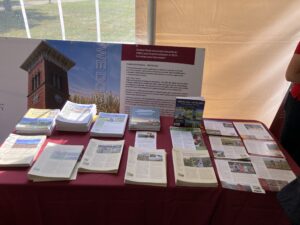
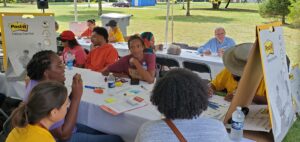
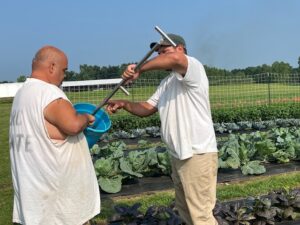
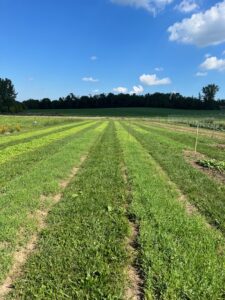
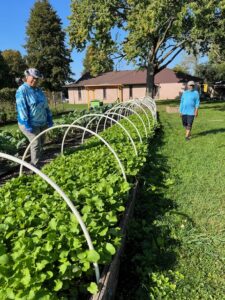
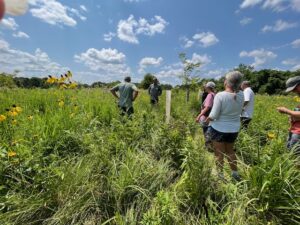 Two hundred- nineteen farmers adopted practices to help mitigate climate change and reduce disruptions in supply change through the implementation of season extension (high and low tunnel production) and crop planning. Eighty-one farmers adopted practices that reduce fossil fuel consumption through the implementation of fuel-efficient BMPs in their growing systems by composting, soil testing for fertility, and incorporating cover crops into their production system to sequester carbon emissions.
Two hundred- nineteen farmers adopted practices to help mitigate climate change and reduce disruptions in supply change through the implementation of season extension (high and low tunnel production) and crop planning. Eighty-one farmers adopted practices that reduce fossil fuel consumption through the implementation of fuel-efficient BMPs in their growing systems by composting, soil testing for fertility, and incorporating cover crops into their production system to sequester carbon emissions.
1) A minimum of 25 underserved farmers & ranchers will adopt sustainable practices that will lead to improved soil health, pest management, and overall business success.
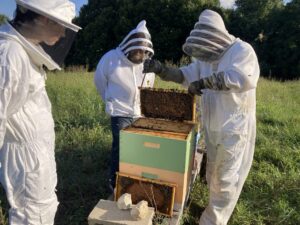
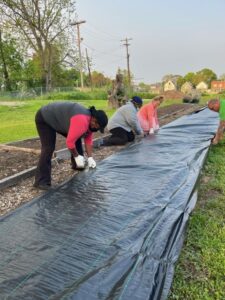
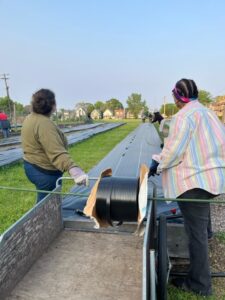 Eighty-three beginning farmers participated in one of the nine different beginning farmer /incubator farm programs across Ohio taught by one of the eight Agriculture and Natural Resource Extension Educators at Central State University. Six of these sites were a part of the Fast Track Farmer grant program held at partnership locations and included 18 classes focused on sustainable production agriculture and 6 classes focused on Sustainable Farm Business Planning. These participants engaged in hands-on learning on the farm at each location. Markets were also set up at some of the sites to help growers establish their farm businesses. One of the sites focused on sustainable hydroponic production. Eight beginning growers spent six months learning to grow in a hydroponic system all elements of production and sales. At all the beginning farmer sites, growers were partnered with a farm mentor. These mentors were instrumental in helping growers adopt sustainable practices and provided needed on-farm support.
Eighty-three beginning farmers participated in one of the nine different beginning farmer /incubator farm programs across Ohio taught by one of the eight Agriculture and Natural Resource Extension Educators at Central State University. Six of these sites were a part of the Fast Track Farmer grant program held at partnership locations and included 18 classes focused on sustainable production agriculture and 6 classes focused on Sustainable Farm Business Planning. These participants engaged in hands-on learning on the farm at each location. Markets were also set up at some of the sites to help growers establish their farm businesses. One of the sites focused on sustainable hydroponic production. Eight beginning growers spent six months learning to grow in a hydroponic system all elements of production and sales. At all the beginning farmer sites, growers were partnered with a farm mentor. These mentors were instrumental in helping growers adopt sustainable practices and provided needed on-farm support.
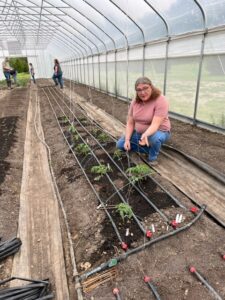
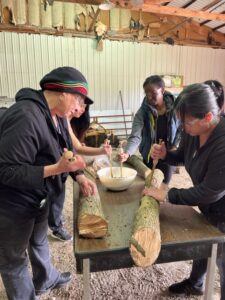 These beginning farmer participants engaged in hands-on workshops in crop planning and recordkeeping and learned the basics of vegetable production for different crop species, seed starting and transplant production, bed preparation, raised bed construction (at urban locations), soil fertility and fertilizer management, succession planting, beekeeping basics, irrigation planning, installation, and water management, tomato production, integrated pest management, insect, disease, and weed identification and management, pesticide safety, business planning marketing, and sales, Good Agriculture Practices food safety, hydroponics, season extension, regenerative agriculture, food preservation, and Ohio Cottage Food Laws. Several sites also engaged in additional specialty crop workshops focused on outdoor mushroom inoculation and production.
These beginning farmer participants engaged in hands-on workshops in crop planning and recordkeeping and learned the basics of vegetable production for different crop species, seed starting and transplant production, bed preparation, raised bed construction (at urban locations), soil fertility and fertilizer management, succession planting, beekeeping basics, irrigation planning, installation, and water management, tomato production, integrated pest management, insect, disease, and weed identification and management, pesticide safety, business planning marketing, and sales, Good Agriculture Practices food safety, hydroponics, season extension, regenerative agriculture, food preservation, and Ohio Cottage Food Laws. Several sites also engaged in additional specialty crop workshops focused on outdoor mushroom inoculation and production.
Educational & Outreach Activities
Participation summary:
Learning Outcomes
Project Outcomes
In 2023, NECIC farmers participating in the Richland Gro-Op were introduced to the Ohio CAN program and encouraged to expand their market to include selling to Ohio Food Pantries via Ohio CAN. To do this, they contracted with another farm and past SARE Farmer Rancher Grant recipient, the Glass Rooster Cannery, to process all excess tomatoes grown not under contract, into tomato sauce. Two thousand pounds of tomatoes were processed into sauce and sold to Ohio CAN through this new program.
In 2023, a specialty crop manager training program was established in partnership with NECIC and the Richland Correctional Institute. The goal was to pilot a new curriculum that could be used to train individuals in specialty crop production with the intent of eventually creating a specialty crop manager certification for Ohio. NECIC received some start-up funding for the program. Richland Correctional Institute provided land, water, and electricity, and inmates close to being released for parole were recruited to participate in the training. CSU Extension educators provided a curriculum and training in Specialty Crops and Business and a NECIC farmer mentor oversaw their day-to-day engagement on the farm. Six participants completed the training. The 3/4 acre farm produced 7500 pounds of produce which was sold through the Richland Gro-Op cooperative. The six participants apprenticed approximately 3800 hours over the year covering all aspects of specialty crop production from crop planning, recordkeeping, tomato trellising, food safety, composting, cover cropping, harvesting, fence construction, outdoor mushroom production, and business planning.
Eight beginning farmers participated in a 6-month immersive Hydroponic Production series. These individuals gained knowledge on all aspects of production, business, and post-harvest management. Upon completion of the training, 2 individuals took farm management positions and one individual started a micro-farm.
Eight CSU Extension educators engaged 160 beginning farmers in one of nine different beginning farmer programs offered through Central State University Extension in Ohio. The individuals participated in an immersive multi-session series that covered all aspects of sustainable specialty crop/vegetable production, farm business planning, and management. Participants engaged in the production of produce and on-site farm apprenticeship at one of the partnering locations with the aid of on-site farm mentors.
Six participants at a Muskingum County Beginning Farmer demo farm started a food pantry using produce grown on the farm. From this effort, two additional food pantry sites were started also using produce grown on the farm. This farm site is located in the Appalachia region where food disparity exists. This site is focused on empowering community members to actively address this issue while finding innovative ways of reducing food deserts in the community. These are self-service food pantries. Beginning farmers were motivated and encouraged when the produce they grew was taken and appreciated by members of the community.
CSU, OEFFA, and OSU applied for and received an OREI grant to implement 5 workshops throughout 2023 and 2024 to create a dynamic discussion and dialog about research and farming to help growers develop researchable ideas that can be implemented on the farm. Two of these workshops were implemented in 2023. At the OEFFA conference, 45 farmers engaged in this discussion, and at the Black Farming Conference 30 farmers engaged in this discussion for a total of 75 farmers in 2023. In January of 2024, 75 farmers participated in this workshop at the Ohio Organic Grain Growers conference. Two more workshops are planned for 2024. At each of these workshops, growers are introduced to the concept of how to develop a research question and given some direction of researching their ideas. They are also introduced to the SARE farmer/rancher grant and given information about when to apply and supporting resources available to them.
CSU extension implemented a beginning beekeeper training series in the Southeast region of Ohio in partnership with area veteran beekeepers who served as program mentors. Sixty beginning beekeepers participated in the 10-part series to increase their understanding and skills in all aspects of beekeeping.
In 2023, 12 farmers in Southwest Ohio established two separate farm cooperatives that service Dayton: Seven Seed Sowers Cooperative and Nu Soul Farm. These beginning growers developed relationships with each other while participating in two different beginning farmer programs. They found they could better meet the vegetable production demands of the local community by pooling their resources. Each cooperative sells its produce at different locations, one through several markets in the city of Trotwood and the other in the Edgemont neighborhood of Dayton. They learned and continue to refine the sustainable production methods they developed in the Central State University Incubator Farm and Fast Track Farming programs they participated in. Beyond production, the Cooperative model is helping their businesses become sustainable.
CSU Extension in partnership with 5 cut flower farmers received a SARE partnership grant to improve cut flower grower communication with buyers through the development of a database application. CSUE enlisted the help of Market Maker, to create the FlowersInSeason.com application. This application will share cut flower availability with buyers to make them more competitive with the imported flower market. The majority of cut flowers sold in the US is from imports. The hope is this application will help buyers find local growers that have the products they need so they can purchase them locally. Locally grown cut flowers have a lower carbon footprint. Hopefully, the app will help these growers grab more of the cut flower market share. The application is still being tested. Currently, 36 Ohio Cut Flower growers and 224 Cut Flower growers from other states are using the site. We hope to see this network grow.
14 farms that sell their produce through the Richland Gro-Op, partnered with a small farm/cannery, the Glass Rooster Cannery ( a former two-time Farmer/Rancher SARE grant recipient) to can their excess produce into value-added products. This partnership helped reduce these farms' waste to less than 1.2%. It also helped them increase their revenue by almost $50,000 and provided them with income during the off-season.
Four farmers at one of the incubator farm sites, have partnered together and created a grower cooperative in Dayton. These growers share the responsibilities of running and managing the farm to lower the overall burden and are collaborating to market and sell their produce.
Face of SARE
Central State University Extension provided outreach and promotion of the SARE program at the following events in 2023 and the beginning of 2024:
Events & Workshops
2023 CSU Researcher introduction to SARE - Wilberforce, OH (20 participants)
2023 OEFFA Conference in Newark, OH - event booth with SARE Materials Sponsored (250 participants) & Organic Farmer Rancher Research Network Workshop (45 participants)
2023 Black Farming Conference in Wilberforce, OH - event booth Sponsored (150 participants) with SARE Materials & Organic Farmer Rancher Research Network Workshop - (30 participants)
2023 Maumee Valley Grower Annual Winter Workshop (27 participants)
2023 OSU Small Farms Symposium in Mansfield, OH - SARE Presentation on Farmer Rancher Grant - (27 participants)
2023 CSU Land Grant Open House (250 participants)
2023 CSU Booth at OSU Farm Science Review
2023 Farmer Veteran Coalition Beekeeping & Hive Improvement Seminar Sponsored (36 participants)
2023 Farmer Veteran Coalition Annual Meeting in Columbus (15 participants)
2023 Farmer Veteran Coalition Forest Farming Event training in SE Ohio (15 participants)
2024 OSU Ohio Organic Grains Conference - Oregon, OH event booth (150 participants) with SARE Materials & Organic Farmer Rancher Research Network Workshop (75 participants)
2024 National Urban Farm Conference - Columbus, OH event sponsor (300 participants)
2024 National BIPOC Black Farmers Network Conference - Columbus, OH grant writing workshop (97 participants)
2024 University of Michigan Tri-state sponsored Regenerative Agriculture Field Tour sponsor(157 participants) - event booth with SARE materials
2024 BIPOC Black Farming Network - Columbus, OH event sponsor ( 150 participants) - event booth with SARE materials
2024 Farmer Veteran Coalition Small Ruminant Workshop sponsor (17 participants) - SARE small ruminant toolkit thumb drives
2024 Ohio State Beekeepers Association Conference - Wilberforce, OH event sponsor (256)- event booth with SARE materials, pre-conference grant writing workshop
2024 Workshops (not connected to a series)
2024 African Heritage Crop Transplanting (5 participants)
2024 African Heritage Seed Germination (3 participants)
2024 Marketing & Selling Your Stuff - AIF Farm (2 participants)
2024 Seed Starting - AIF Farm (5 participants)
2024 Beginning Farmer - Muskingum Co (25 participants)
2024 Cool Season Crop Production - Carter Farm (7 participants)
2024 Crop Planning - Carter Farm (4 participants)
2024 Heirloom Tomato Grafting ( 8 participants)
2024 Seed Starting - Carter Farm (9 participants)
2024 Tomatoes & Melons - Carter Farm (10 participants)
2024 Ag Forum - CIFT - How MarketMaker Can Help Buyers Find Farmers (19 participants)
2024 Composting with Worms (11 participants)
2024 Tomato Grafting Workshop - Xenia (16 participants)
2024 Developing a Small Farm Niche- Pike (10 participants)
2024 Direct Sales Women in Ag Forum (20 participants)
2024 DIY on Farm Research Workshop - Lucas Co (54 participants)
2024 DIY on Farm Research Workshop with OOFRN Licking ( 25 participants)
2024 Farm Business Planning - Lucas Co (9 participants)
2024 Farm Business Planning - Muskingum Co (2 participants)
2024 Fruit Tree Pruning Workshops - Wood (7 participants)
2024 Funding Your Farm (35 participants)
2024 Good Agricultural Practices (30 participants)
2024 Grafting Heirloom Tomatoes (8 participants)
2024 Mobility Matters - Mobile Fencing and Housing of Poultry (30 participants)
2024 Mushroom Innoculation Workshop - Paulding (17 participants)
2024 SARE grant writing workshop at BIPOC Farmers Conference in Columbus (52 participants)
2024 Season Extension (8 participants)
2024 Small Farms Small Equipment (6 participants)
2024 Wire Fence Construction (2 participants)
2024 African Heritage Planting with 4H (35 participants)
2024 Farm Marketing Workshop at RidAll Urban Farms (29 participants)
2024 Mushroom Log Inoculation Workshop - Greene (23 participants)
2024 Mushroom Log Inoculation Workshop - Clinton (34 participants)
2024 Ready Set Grow! Agribusiness - (19 participants)
Handouts and Educational Materials of the Following Programs
2023 Fast Track Farmer - Toledo (Sustainable Business Planning Workbook + Miscellaneous Handouts) (21 participants)
2023 Fast Track Farmer - Warren (Sustainable Business Planning Workbook + Miscellaneous Handouts) (10 participants)
2023 Fast Track Farmer - Koit Farmers Market (Sustainable Business Planning Workbook + Miscellaneous Handouts) (9 participants)
2023 Fast Track Farmer - Springfield (Sustainable Business Planning Workbook + Miscellaneous Handouts) (4 participants)
2023 Hydroponic Production - Cleveland (Sustainable Business Planning Workbook + Miscellaneous Handouts) (8 participants)
2023 Specialty Crop Manager - Mansfield (Sustainable Business Planning Workbook + Miscellaneous Handouts) (6 participants)
2023 Columbus Beginning Urban Farmer (Sustainable Business Planning Workbook + Miscellaneous Handouts) (8 participants)
2023 Incubator Farm Program - Trotwood (Sustainable Business Planning Workbook + Miscellaneous Handouts) (12 participants)
2023 Incubator Farm Program - Edgemont (Sustainable Business Planning Workbook + Miscellaneous Handouts) (7 participants)
2023 Beginning Farmer Program - Zanesville (Sustainable Business Planning Workbook + Miscellaneous Handouts) (6 participants)
2023 Marion Microfarm - Marion (Sustainable Business Planning Workbook + Miscellaneous Handouts) (9 participants)
2023 Beginning Beekeeper Series - SE Ohio (Miscellaneous SARE Handouts) (60 participants)
2024 Fast Track Farmer - Toledo (Sustainable Business Planning Workbook + Miscellaneous Handouts)
2024 Fast Track Farmer - Warren (Sustainable Business Planning Workbook + Miscellaneous Handouts)
2024 Fast Track Farmer - Koit Farmers Market (Sustainable Business Planning Workbook + Miscellaneous Handouts)
2024 Fast Track Farmer - Springfield (Sustainable Business Planning Workbook + Miscellaneous Handouts)
2024 Hydroponic Production - Cleveland (Sustainable Business Planning Workbook + Miscellaneous Handouts)
2024 Specialty Crop Manager - Mansfield (Sustainable Business Planning Workbook + Miscellaneous Handouts)
2024 Columbus Beginning Urban Farmer (Sustainable Business Planning Workbook + Miscellaneous Handouts)
2024 Incubator Farm Program - Trotwood (Sustainable Business Planning Workbook + Miscellaneous Handouts)
2024 Incubator Farm Program - Edgemont (Sustainable Business Planning Workbook + Miscellaneous Handouts)
2024 Beginning Farmer Program - Zanesville (Sustainable Business Planning Workbook + Miscellaneous Handouts)